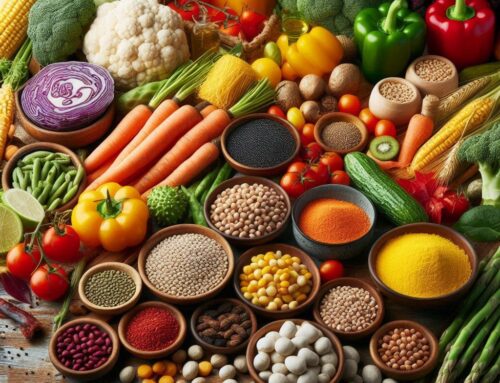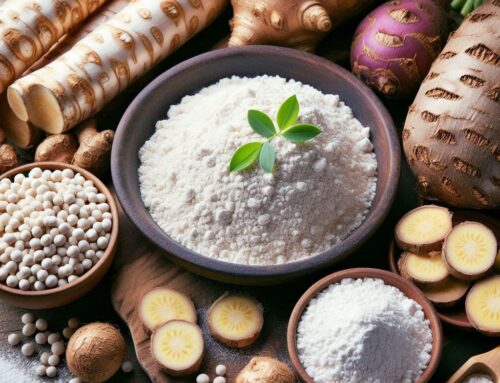
Introduction to Konjac Jelly: A Popular Dietary Supplement
Konjac jelly has rapidly gained popularity as a dietary supplement, celebrated for its health benefits and versatility. Derived from the root of the konjac plant, this unique jelly is rich in glucomannan, a type of dietary fiber known for its ability to absorb water and expand in the stomach. This property makes konjac jelly an excellent low-calorie snack option for those looking to manage their weight while still feeling satiated.
Glucomannan’s high fiber content not only aids in digestion but also helps regulate blood sugar levels and cholesterol, making it a valuable addition to any diet. The gelatinous texture of konjac jelly provides a satisfying mouthfeel without adding significant calories, making it an ideal choice for health-conscious individuals.
Incorporating konjac jelly into your diet is simple and convenient. It can be enjoyed on its own as a snack or used as an ingredient in various recipes to enhance nutritional value without compromising on flavor or texture. As more people seek natural ways to support their health goals, konjac jelly stands out as a functional food that combines tradition with modern dietary needs.
Understanding the Nutritional Composition of Konjac Jelly
Konjac jelly, a popular health food, is gaining attention for its impressive nutritional profile and potential health benefits. One of the key components of konjac jelly is glucomannan, a type of soluble fiber derived from the root of the konjac plant. This fiber is renowned for its ability to absorb water and expand in the stomach, which can help promote a feeling of fullness and aid in weight management.
The high fiber content in konjac jelly not only supports digestive health by promoting regular bowel movements but also plays a role in maintaining healthy cholesterol levels. This makes it an appealing option for those looking to improve their heart health naturally. Additionally, glucomannan has been studied for its potential to stabilize blood sugar levels, making konjac jelly an attractive choice for individuals managing diabetes.
Beyond these benefits, konjac jelly is low in calories and contains no fat or sugar, making it an excellent snack option for those seeking to reduce their caloric intake without sacrificing satisfaction. As more people become aware of these nutritional advantages, konjac jelly continues to secure its place as a staple in healthy diets worldwide.
The Science Behind Konjac Jelly and Digestive Health
Konjac jelly, a popular health food, has gained attention for its potential benefits to digestive health. At the heart of these benefits is the konjac plant’s high content of soluble fiber, known as glucomannan. Understanding how fiber affects digestion is crucial to appreciating why konjac jelly is often recommended for gut health.
Soluble fiber plays a significant role in maintaining digestive health by absorbing water and forming a gel-like substance in the stomach. This process not only helps slow down digestion, allowing for better nutrient absorption but also promotes regular bowel movements by adding bulk to stool. The digestive health benefits of konjac jelly are largely attributed to this mechanism.
Moreover, soluble fiber like that found in konjac can support gut health by acting as a prebiotic. Prebiotics serve as food for beneficial gut bacteria, fostering a healthy microbiome balance which is essential for overall well-being. By incorporating konjac jelly into your diet, you can leverage these properties to potentially improve your digestive system’s efficiency and resilience.
In summary, the science behind konjac jelly highlights its valuable contribution to digestive health through its rich soluble fiber content. Whether you’re looking to enhance nutrient absorption or support your gut microbiome, konjac jelly offers an effective and natural option worth considering.
The Connection Between Fiber Intake and Constipation: Can Konjac Jelly be a Culprit?
Understanding the intricate relationship between fiber intake and constipation is crucial for maintaining digestive health. Fiber, a vital component of our diet, plays a significant role in promoting regular bowel movements. However, the balance is key; both insufficient and excessive fiber intake can lead to digestive issues.
Konjac jelly, a popular dietary supplement known for its high fiber content, often comes under scrutiny when discussing constipation. The question “does konjac cause constipation?” arises frequently among those seeking to improve their dietary habits. While konjac itself is not inherently constipating, excessive consumption of this fiber-rich food can potentially lead to digestive discomfort. This is because an abrupt increase in fiber intake without adequate hydration can slow down digestion and cause bloating or constipation.
The effects of excessive fiber intake highlight the importance of gradual dietary adjustments and sufficient water consumption. When incorporating high-fiber foods like konjac jelly into your diet, it’s essential to increase your water intake accordingly to help the fiber move smoothly through your digestive system.
In conclusion, while there isn’t a direct link suggesting that konjac jelly causes constipation per se, it serves as a reminder that moderation and balance are critical when it comes to dietary fibers. For optimal digestive health, it’s best to introduce any high-fiber foods gradually while ensuring you maintain adequate hydration levels throughout the day.
User Experiences: What People Say About Consuming Konjac Jelly
Konjac jelly, a popular dietary supplement known for its glucomannan content, has garnered attention for its potential health benefits, particularly in aiding digestion. Consumer testimonials provide valuable insights into how this product is perceived and experienced by those who incorporate it into their daily routines.
Many konjac jelly reviews highlight the positive effects on digestion. Users often report feeling fuller for longer periods, which can be attributed to the high fiber content of glucomannan. This aspect of konjac jelly is frequently praised by individuals looking to manage their weight or improve their digestive health. Personal stories abound with accounts of reduced bloating and more regular bowel movements, suggesting that konjac jelly may indeed support digestive wellness.
However, as with any supplement, experiences can vary widely among users. Some consumers have noted minimal effects or initial digestive discomfort as their bodies adjust to the increased fiber intake. These varied experiences underscore the importance of starting with small amounts and gradually increasing consumption to allow the body time to adapt.
Overall, consumer testimonials on digestion with konjac jelly paint a picture of a product that holds promise for many seeking natural ways to enhance their digestive health. As always, it’s advisable for potential users to consult healthcare professionals before making significant changes to their dietary regimen.
Expert Opinions: Nutritionists Weigh in on the Effects of Konjac Jelly on Digestion
Konjac jelly, made from the root of the konjac plant, has gained attention for its potential digestive benefits, primarily due to its high glucomannan content. Nutritionists are increasingly examining how this fiber supplement can influence digestive health. Glucomannan is a water-soluble dietary fiber that expands in the stomach, promoting a feeling of fullness and supporting regular bowel movements.
Experts highlight that glucomannan’s ability to absorb water aids in softening stools and enhancing intestinal transit time, making it a useful addition for those experiencing constipation. However, nutritionists also caution that while konjac jelly can be beneficial for digestion, it should be consumed with adequate water intake to prevent any risk of gastrointestinal blockage.
Furthermore, expert advice suggests integrating konjac jelly as part of a balanced diet rather than relying on it as a sole solution for digestive issues. This ensures individuals receive diverse nutrients necessary for overall gut health. As with any supplement, consulting with a healthcare professional before incorporating konjac jelly into your diet is recommended to tailor it to your specific health needs and conditions.
If You Experience Digestive Issues with Konac Jelly: Tips for Managing Fiber Intake Effectively
If you’re experiencing digestive issues with Konac Jelly, it’s important to manage your fiber intake effectively to avoid discomfort. Safely increasing dietary fiber is a gradual process that requires attention to both the quantity and type of fiber you consume. Start by slowly incorporating more high-fiber foods into your diet, allowing your digestive system time to adjust. This approach helps in preventing constipation naturally by ensuring that your body can handle the increased fiber without causing blockages.
Hydration plays a crucial role when consuming high-fiber foods. Fiber absorbs water as it moves through the digestive tract, so staying well-hydrated is essential for maintaining smooth digestion and preventing constipation. Aim to drink at least eight glasses of water a day, and consider adding herbal teas or infused waters for variety.
In addition to these hydration tips, pay attention to how different sources of fiber affect you personally. Some people may find that certain fruits or vegetables cause more bloating than others, so keeping a food diary can help identify which foods work best for you. By taking these steps, you can enjoy the benefits of increased dietary fiber while minimizing any potential digestive discomfort associated with Konac Jelly or other high-fiber foods.






